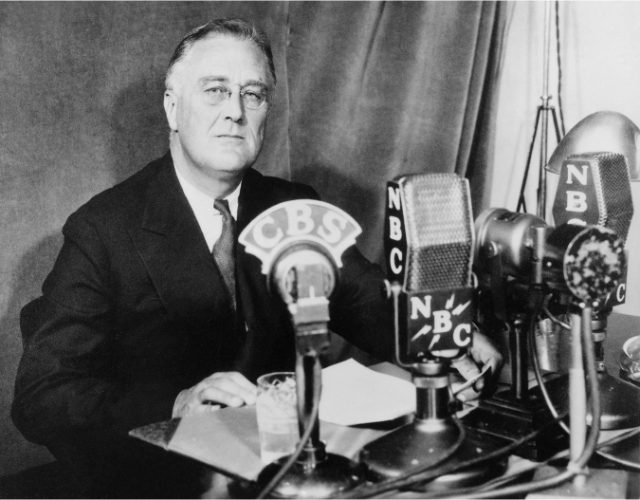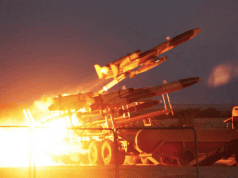.
By Rachel Avraham
Ken Abramowitz, the founder of Save the West, held a recent webinar where he
declared the importance of having a Defense Production Act in our times. The
roots for the Defense Production Act date back to the Second World War.
As Abramowitz noted, “During World War II, the US was weak, and the Japanese
and Germans were strong, and so they attacked America at Pearl Harbor.”
Tragically, 2,403 American servicemen were killed when the Japanese attacked
Pearl Harbor. However, after the Japanese attacked Pearl Harbor, the first War
Powers Act and then the Second War Powers act were passed, which enabled the
US to better deal with such threats.
According to Yale University, “The first War Powers Act was passed on December
18, 1941, and gave the president broad powers to reorganize the functions of
any executive agency for the purpose of fighting the war. President Franklin
Delano Roosevelt issued a total of 75 executive orders under this act. The
second War Powers Act, signed into law on March 27, 1942, allowed the President
to allocate resources, acquire land and property, and compel businesses to take
on government contracts for national defense. The second Act also permitted the
Federal Reserve to purchase up to $5 billion in Treasury bonds directly from
the U.S. government”.
Dr. Stephen Salomon, who was born in 1939, was a child living in Pittsburgh
during the Second World War. He recalls the influence of the first and second
War Powers Act as follows: “Pittsburgh was a big steel production center.
There were two big steel companies, Jones and Laughlin, and US Steel. Their
main products were the plates for battleships. My father was involved in that
because they made steel strapping, so when they had big plates, they would
be attached and then assembled into battleships in Baltimore. There may
have been other places too.”
“Another thing I remember is my friend Richard Hommel. His father had a
a glass factory, but it was converted to making explosives. They had a big fire
there and it disfigured his arms. The other thing I remember there was a lot
of smoke in Pittsburgh because they burned many things in the furnaces to
make steel and that is how Pittsburgh got the name “The Smokey City”.
Dr. Salomon related how people back in the early 1940’s was more communally
focused than they are today: “My sister and I had a victory garden. We planted
vegetables to eat because you could not get vegetables in the store because they
were delivered overseas to the soldiers, so civilians had to grow food for
themselves.We had carrots, lettuce, beans, corn on the cob, and tomatoes and
everything that was easy to grow we had. Some people in the neighborhood even had
chickens in the backyards.
“My father had special privileges,” he added. “Gas wasrationed. But my father had
extra privileges for gasoline because he was in war production. We also supplied components for the atomic bomb. If they needed steel, we sent it. They also built a pipeline from Texas to Pittsburgh for natural gas. My father did the pipes for that. He determined how to strap them on rail cars so they could be shipped on a construction site. He used geometry. They switched from three pipes to five pipes per rail car. It made the shipment during wartime more efficient.”
Nevertheless, Dr. Salomon noted that although this massive production of steel was
good for the US war effort, it was hard on his mother: “My mother used to complain
that my father would come back from work and his shirt was full of coal dust for
he went into the steel mills frequently. This forced her to do more laundry. She
also complained about cleaning the drapes and curtains all of the time, for they
were full of coal dust. They also had to paint the inside of the house more frequently
for the same reason.”
According to him, although these measures made life difficult, “This all helped
the US war effort during World War II. We had blackouts for we feared enemy
bombers would come to blow up the steel mills, but it never happened. At night, we
had to pull the shades down so nobody could see the lights of the city at night.
In case the enemy attacked, my mother was the nurse for the street. She was trained
as a nurse.”
Dr. Salomon noted that the Second World War greatly influenced him as a kid: “They had a game for kids where we had a toy plane and dropped marbles out of the plane, and dropped it on cities. We used to say, “Bombs over Tokyo.” That was when the US bombed Tokyo during World War II. At the time, I liked the game, but afterwards as an adult, I think it was awful.”
“Schools were not closed, however,” he noted. “We went to summer camp too. We had enough gasoline for the buses to take the kids to summer camp during the summer. Because there was a shortage of gasoline, if you were privileged enough to drive into town, you would pick up strangers along the way. Every car had six to eight people jammed into a car, even if they were strangers. You were obligated to pick them up, even if they were strangers. People had a more cooperative attitude back then.”
“We recycled everything. My job was to take to the elementary school nearby
cans, bottles, wires, and hangers. Any kind of cooking grease we also collected. The grease was used when they shipped the war supplies overseas, which was coated with that material as a protective covering against the salt air at sea. That was before they had container ships like today.”
Abramowitz concluded with the thought, “Never again do we need 60 million
Americans to die. The Defense Production Act of 1950, which came after the First and Second Wars Power Act, can order companies to increase production. Russia, China and Iran are all threatening America. They are all self-emboldened. The Russians attacked Ukraine because we made Ukraine look like a sitting duck. We inadvertently provoked Russia to invade the Ukraine. Russia, China and Iran can attack us and our allies together. We have one war in Ukraine and Russia, but we have to be prepared for a China-Taiwan War and an Israel-Iran war.
“We must replace the inventory used up in the Ukraine and Russia war. We have to build missile defense systems to protect ourselves from North Korea and Iran. There is a lag time of two or ten years to make such equipment, so you have to place the orders right now, so the manufacturers can fulfill the shipment. If we are not getting the speed that we expect, the President should increase the quantities required under the Defense Production Act. A military beef-up is to avert the chances of war. Remember, when the US created Star Wars, it deterred the Soviets.”
 Rachel Avraham is a political analyst working for the Safadi Center for International Diplomacy, Research, Public Relations and Human Rights, which is run by Mendi Safadi, a former Likud Candidate for the Knesset and a former chief of staff of former Israeli Communication Minister Ayoob Kara. Since 2012, she has been working as an Israel-based journalist and writer, for the Daily Wire, the Christian Post, the Baltimore Jewish Times, the Jerusalem Post, Israel Hayom, Ahval and many other publications across the globe. She received her MA in Middle Eastern Studies from Ben-Gurion University. She got her BA in Government and Politics with minors in Jewish Studies and Middle Eastern Studies from the University of Maryland at College
Rachel Avraham is a political analyst working for the Safadi Center for International Diplomacy, Research, Public Relations and Human Rights, which is run by Mendi Safadi, a former Likud Candidate for the Knesset and a former chief of staff of former Israeli Communication Minister Ayoob Kara. Since 2012, she has been working as an Israel-based journalist and writer, for the Daily Wire, the Christian Post, the Baltimore Jewish Times, the Jerusalem Post, Israel Hayom, Ahval and many other publications across the globe. She received her MA in Middle Eastern Studies from Ben-Gurion University. She got her BA in Government and Politics with minors in Jewish Studies and Middle Eastern Studies from the University of Maryland at College





